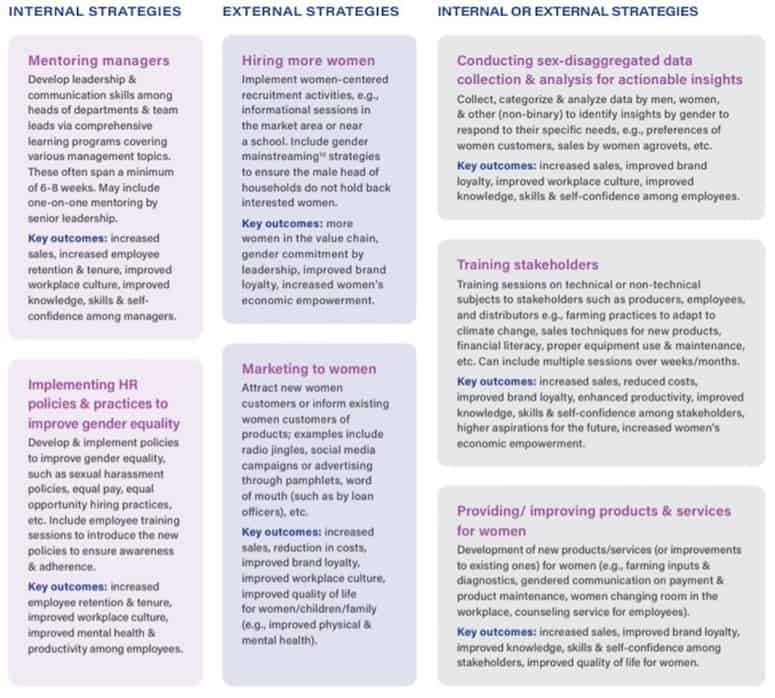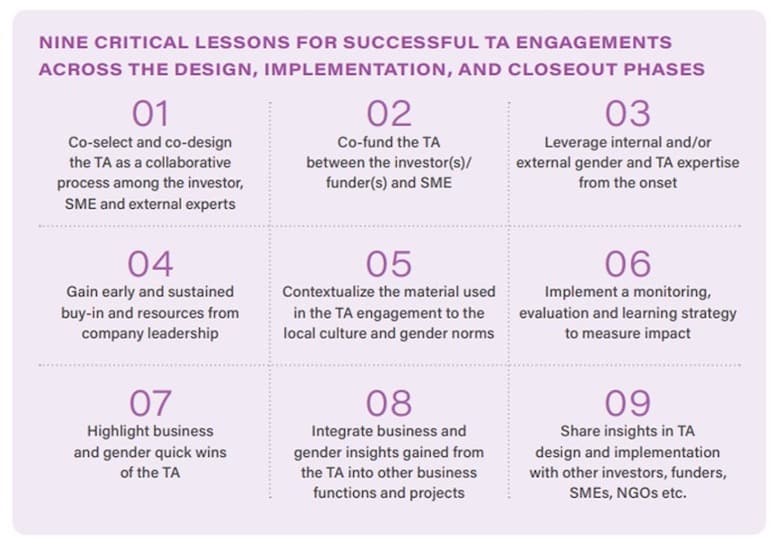Bringing a Gender Lens to Technical Assistance: New Research Reveals the Benefits and Costs of Gender-Smart TA to SMEs and Investors
Gender lens investing includes three key entry points for investors: (1) providing capital to women-led/founded companies and/or gender-forward businesses; (2) applying a gender lens to the investment cycle, such as during pipeline development; and (3) funding and supporting the design and implementation of gender-inclusive technical assistance (TA) activities. But though there’s growing momentum behind gender lens strategies in the impact investing space, investors often focus on the first two of these entry points, largely ignoring gender while providing TA and other types of post-investment support.
From June 2019-2022, the AlphaMundi Foundation, Acumen, AHL Venture Partners, Root Capital, SEAF and Shell Foundation launched the Gender-Smart Enterprise Assistance Research Coalition (G-SEARCh) consortium to conduct new research in the gender lens investing community. These impact investors and one of their key implementation partners, Value for Women, saw that investors were missing an opportunity for higher returns by overlooking gender in their post-investment support activities with their portfolio companies, while companies were missing a similar opportunity by deprioritizing gender in their value chains. With more than $700 million in combined assets under management, the G-SEARCh investors were keen to build a greater understanding of the business case for gender-smart TA in small and medium enterprises (SMEs).
To that end, the G-SEARCh consortium brought in the William Davidson Institute at the University of Michigan (WDI) as an independent, third-party academic research partner. For more than 30 years, the Institute has worked to unlock the power of business to provide lasting economic and social prosperity in low- and middle-income countries. A key component of this mission is WDI’s Performance Measurement and Improvement team, which designs strategies to measure impact and strengthen programs in real-time. In this project, G-SEARCh and WDI’s shared goals were to understand the financial benefits and other business outcomes of the TA engagements, the social outcomes of these activities on the SMEs’ target stakeholders (i.e., their employees, customers, distributors and producers), and any factors that affected the TA rollout (e.g., monetary costs and unintended negative impacts of the activities).
The research included 21 SMEs that implemented seven types of gender-smart TA strategies (see Figure 1) during the height of the COVID-19 pandemic. The G-SEARCh investors funded or subsidized these TA activities with each SME for a specific time (on average, nine months) – a period the consortium referred to as the pilot. Using participatory research methods, WDI developed a research framework and analysis plan and designed studies – keeping in mind the distress caused by the pandemic and our stakeholders’ changing priorities and resources. Due to time constraints, the qualitative and quantitative data collection with most SMEs was completed three months after pilot completion.

Figure 1: Seven types of TA, and possible business and social outcomes for the SME and its stakeholders
Understanding the Business and Social Outcomes of Gender-Smart Technical Assistance
Through interviews with company representatives, the research found that gender-smart TA can provide several business outcomes for companies. For the SMEs in the pilot, these outcomes included:
- Improved brand loyalty (as reported by 86% of our sample SMEs), due to stakeholders having the opportunity to share their preferences and challenges with the SME.
- Improved workplace culture, with 76% of SMEs reporting improvement in gender perceptions and attitudes towards women, 57% reporting a formal commitment to gender equality from leadership, 38% reporting increased sales or number of customers, and 38% reporting more interest or funding from new or existing investors.
Through these interviews and additional surveys with stakeholders of five companies (discussed later), the research found that social outcomes for the TA’s target stakeholders included:
- Increased pride or loyalty to the company (as reported by 71% of our sample SMEs).
- Improved skills and knowledge (reported by 67%), greater self-confidence (reported by 67%) and improved mental health (reported by 48%).
- Higher income or job engagement (reported by 57%).
- Greater respect and standing in the workplace and/or community (reported by 62%).
The final report captures the whole gamut of outcomes across all seven types of TA engagements, and also catalogs the frequency of observed business and social outcomes within each type of TA strategy.
It is critical to note that each TA engagement studied in the sample was highly customized and designed for specific business goals. Thus, not all TA activities generated all the types of business and social outcomes observed in the study. Moreover, the report does not claim that one type of TA is better than another, or that all potential business and social outcomes were identified. Indeed, respondents from 43% of the SMEs shared that it was too early to determine all of their business outcomes during the interview process – especially those outcomes related to changes in financial performance, such as net margins. Similarly, 30% of respondents reported that it was too early to identify all social outcomes. Many respondents also shared that they had little or no resources to systematically measure social outcomes, e.g., to provide secondary data on how the TA strategies had impacted stakeholders’ productivity, quality of life, support for their household members, etc.
The G-SEARCh research reports also include five case studies focused on individual SMEs, such as Sanergy, an award-winning SME in Kenya. Sanergy’s training program aimed to impart sales and marketing skills to agrovets (i.e., people running end-to-end supply stores for farmers) in Kenya, in order to help them sell a newly introduced Sanergy product. Our research found that 77% of responding agrovets often or always applied the information they learned from the training sessions. Sanergy also reported a 200% increase in product sales during the pilot period. The case study research methodology and surveys are available in the G-SEARCh toolkit.
Technical Assistance to SMEs: Key Lessons and Unanswered Questions
WDI also investigated the monetary, human and technical costs that SMEs incurred while engaging in TA activities. Respondents from 38% of the SMEs reported a strain on resources while implementing the TA, even with support from the investors. These strains included both monetary costs and the stress and burden on SME management and staff responsible for TA activities. WDI did not receive a detailed cost breakdown from most SMEs, due to the added burden of this task during the pandemic. However, the general information provided to us by SMEs confirmed that most costs fell between US $10,000 to $50,000 per engagement. Given the unknown status of longer-term business and social outcomes and the missing data on costs, it is difficult to calculate the net benefits of gender-smart TA. However, 86% of the SMEs in the sample continued TA activities even after the pilot concluded – i.e., these activities were integrated into operations as initially implemented or with improvements based on lessons from the pilot.
While we identified numerous business and social outcomes and process recommendations in the design and implementation of TA (see Figure 2), along with some costs of TA implementation, we could not answer all the questions posed by our research. This was due to the lack of secondary data, the small sample size, a research timeline that did not allow us to measure longer-term impacts, and the lack of a comparison group to help us assess whether the impacts we were observing among participating SMEs were solely due to the TA or other factors.

Figure 2: Lessons for successful TA by phase (design, implementation and closeout)
However, our research also taught us many additional lessons, including best practices in WhatsApp and remote data collection. It further highlighted the monetary and technical support SMEs and investors need, in order to engage in sustainable impact management and measurement that tests their impact thesis and, more importantly, supports the SME in real-time strategic learning and continuous improvement. Our experience showed that secondary data is critical yet lacking industry-wide: This suggests a need for researchers to train SME staff on impact management and measurement, and for funders to invest in SME capacity development – instead of simply rushing to fund researchers to collect primary data. And finally, this research taught us that while some features of ethical research, such as obtaining informed consent and maintaining respondent safety, are a must-have irrespective of costs, other features, such as sharing insights with the stakeholders who provide the data, are expensive and often cannot be carried out.
Furthermore, this experience helped the AlphaMundi Foundation to: institutionalize our gender policies; ensure new team members receive gender awareness training; strengthen our network with other development finance institutions, donors, investors, etc.; help raise new donor capital for more TA implementation with portfolio companies; and participate in further research and development of tools in the gender lens investing sector.
In conclusion, the findings from this project are encouraging, but more resources are needed to follow up with companies and discern the longer-term outcomes of gender-smart TA. The consortium hopes that the insights from this research can generate new dialogue among investors and funders around the need to collaborate with their portfolio companies to fund, test and measure this technical assistance.
All G-SEARCh knowledge products can be found here. For investors interested in getting started or continuing to advance their work in gender lens investing, the consortium developed a separate guide – “G-SEARCh tested tools and approaches for gender lens investing” – to document the six G-SEARCh investor approaches. The consortium also released key social and financial performance indicators to guide indicator selection. If you have questions about this research, we welcome you to contact Yaquta Fatehi at wdi-performancemeasurement@umich.edu.
We thank our funders: the International Development Research Centre and the United States Agency for International Development.
Yaquta Kanchwala Fatehi is a program manager for the Performance Measurement Initiative of the William Davidson Institute at the University of Michigan, Lisa Willems is the founder of the AlphaMundi Foundation and Ladé Araba is the Executive Director of the AlphaMundi Foundation.
Photo courtesy of the AlphaMundi Foundation.
- Categories
- Impact Assessment, Investing




